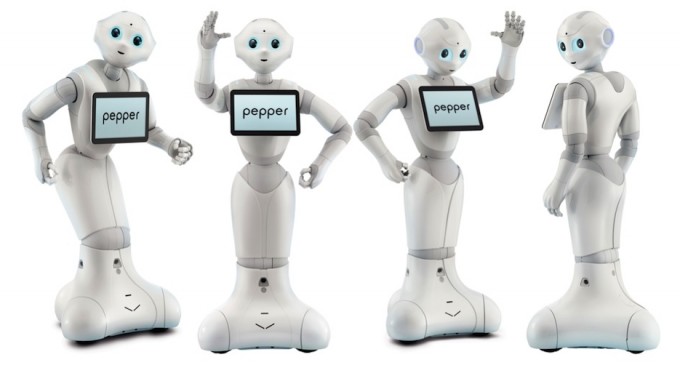Pepper, a new humanoid robot introduced earlier this month in Japan, may herald the beginning of a new era in personal robotics. Unlike its ancestors, such as Mitsubishi’s Wakamaru and Sony’s QRIO, who had to join the halls of robot extinction, Pepper, developed jointly by the French robotics company Aldebaran and the Japanese telecom giant SoftBank, is here to stay.
Although the robot aims at possibly the most unreachable market in robotics industry, that of personal household robots, there are several major factors that can play a decisive role in Pepper’s future: his advanced emotional intelligence, surprisingly low price, and, of course, let’s not forget that looks matter – Pepper’s design is every bit gorgeous.
Softbank plans to start selling the robots next year in Japan for about $ 1,900. Until then, people can get acquainted with Pepper at certain SoftBank stores in Japan.
Although Pepper might initially seem quite unpractical – it will not clean your house and may not even be able to effectively fetch things – the robot’s strong suit lies in its ability to be good company.
Pepper’s communication skills are the result of special software that allows it to effectively analyze human emotions by combining information about voice tone, facial expressions and body language. In this way Pepper will tailor each individual conversation based on how its interlocutors feel and behave. While by no means the first robot to do so, Pepper may well be the first consumer available robot with such advanced emotion-reading capabilities.
The cutting-edge emotion engine will be supported by a cloud-based “collective wisdom”, where all Pepper robots will be able to upload valuable information about their interactions with humans. Taken together, this data will allow them evolve and polish their communication skills. As an example, hundreds of robots could store information about whether a particular joke makes people laugh, and then decide whether the same joke will be appropriate in other situations.
Pepper’s emotional intelligence is a logical progression of Aldebaran’s pursuit of companion robots capable of living with humans and responding to their constantly changing moods and feelings. The robot is strongly reminiscent of Aldebaran’s previous hit Nao, but, unlike his little brother, uses wheels instead of legs to move around – a choice dictated by power efficiency requirements.
A legged version of Pepper, however, might also see the light: Aldebaran’s legged Romeo robot, which still remains in development, can in the future serve as a foundation for a legged version of Pepper. You can read a previous post to learn more about the ongoing Romeo project.
Allowing robots to understand human emotions and express their own is a critical step towards improving human robot interaction in all settings. Read this post to learn about some ongoing European projects that aim to improve emotional intelligence in robots.





